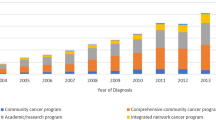Abstract
Background
The American College of Surgeons Oncology Group Z1031 trial demonstrated that neoadjuvant endocrine therapy (NET) increased breast-conserving surgery (BCS) rates for postmenopausal patients with clinical tumor stage 2–4c estrogen receptor-positive breast cancer. We evaluated national trends in NET use in relation to the conduct of the Z1031 trial and the impact of NET on the rates of BCS.
Methods
Using the National Cancer Data Base (NCDB), we identified all cT2–4c hormone receptor (HR)-positive breast cancer patients age ≥50 years from 2004 to 2012. The time intervals of pre-Z1031 (2004–2006), during Z1031 (2007–2009), and post-Z1031 (2010–2012) were examined, and adjusted analyses were performed using multivariable logistic regression.
Results
Of 77,272 patients, 2294 (3.0 %) received NET. Clinical T-stage distribution was 66,885 (86.6 %) for cT2, 7318 (9.5 %) for cT3, and 3069 (4.0 %) for cT4a–c. A small but statistically significant increase in NET use was noted, from 2.7 % pre-Z1031 to 3.2 % post-Z1031; the adjusted odds ratio (OR) for NET was 1.28 [95 % confidence interval (CI) 1.13–1.45; p < 0.001] for post-Z1031 versus pre-Z1031. NET use varied by clinical T stage, increasing from 1.8 % pre-Z1031 to 2.4 % post-Z1031 in cT2 patients (p < 0.001) and from 6.3 % pre-Z1031 to 7.4 % post-Z1031 in cT3 patients (p = 0.02). Patients receiving NET were more likely to undergo BCS compared with patients undergoing primary surgery (46.4 vs. 43.9 %; p = 0.02) with an adjusted OR of 1.60 (95 % CI 1.46–1.75; p < 0.001).
Conclusions
NET use has increased slowly since the Z1031 trial; however, overall use remains low. NET significantly increased the rates of BCS in patients with HR-positive clinical T2–4c breast cancer. Clinicians should consider NET use for patients with HR-positive breast cancer interested in BCS.


Similar content being viewed by others
References
Eiermann W, Paepke S, Appfelstaedt J, et al. Preoperative treatment of postmenopausal breast cancer patients with letrozole: a randomized double-blind multicenter study. Ann Oncol. 2001;12(11):1527–32.
Smith IE, Dowsett M, Ebbs SR, et al. Neoadjuvant treatment of postmenopausal breast cancer with anastrozole, tamoxifen, or both in combination: the immediate preoperative anastrozole, tamoxifen, or combined with tamoxifen (IMPACT) multicenter double-blind randomized trial. J Clin Oncol. 2005;23(22):5108–16.
Ellis MJ, Suman VJ, Hoog J, et al. Randomized phase II neoadjuvant comparison between letrozole, anastrozole, and exemestane for postmenopausal women with estrogen receptor-rich stage 2 to 3 breast cancer: clinical and biomarker outcomes and predictive value of the baseline PAM50-based intrinsic subtype—ACOSOG Z1031. J Clin Oncol. 2011;29(17):2342–9.
Colleoni M, Bagnardi V, Rotmensz N, et al. Increasing steroid hormone receptors expression defines breast cancer subtypes non responsive to preoperative chemotherapy. Breast Cancer Res Treat. 2009;116(2):359–69.
Ellis MJ, Coop A, Singh B, et al. Letrozole is more effective neoadjuvant endocrine therapy than tamoxifen for ErbB-1- and/or ErbB-2-positive, estrogen receptor-positive primary breast cancer: evidence from a phase III randomized trial. J Clin Oncol. 2001;19(18):3808–16.
Van De Water W, Fontein DBY, Van Nes JGH, et al. Influence of semi-quantitative oestrogen receptor expression on adjuvant endocrine therapy efficacy in ductal and lobular breast cancer—a TEAM study analysis. Eur J Cancer. 2013;49(2):297–304.
International Breast Cancer Study Group (IBCSG). Endocrine responsiveness and tailoring adjuvant therapy for postmenopausal lymph node-negative breast cancer: a randomized trial. J Natl Cancer Inst. 2002;94(14):1054–65.
Goldhirsch A, Ingle JN, Gelber RD, et al. Thresholds for therapies: highlights of the St Gallen International Expert Consensus on the primary therapy of early breast cancer. Ann Oncol. 2009;20:1319–29.
Harvey JM, Clark GM, Osborne CK, Allred DC. Estrogen receptor status by immunohistochemistry is superior to the ligand-binding assay for predicting response to adjuvant endocrine therapy in breast cancer. J Clin Oncol. 1999;17(5):1474–81.
Abrial C, Mouret-Reynier M, Curé H, et al. Neoadjuvant endocrine therapy in breast cancer. Breast. 2006;15(1):9–19.
Kaufmann M, von Minckwitz G, Mamounas EP, et al. Recommendations from an international consensus conference on the current status and future of neoadjuvant systemic therapy in primary breast cancer. Ann Surg Oncol. 2012;19(5):1508–16.
Disclosures
No disclosures.
Author information
Authors and Affiliations
Corresponding author
Electronic supplementary material
Below is the link to the electronic supplementary material.
Rights and permissions
About this article
Cite this article
Chiba, A., Hoskin, T.L., Heins, C.N. et al. Trends in Neoadjuvant Endocrine Therapy Use and Impact on Rates of Breast Conservation in Hormone Receptor-Positive Breast Cancer: A National Cancer Data Base Study. Ann Surg Oncol 24, 418–424 (2017). https://doi.org/10.1245/s10434-016-5585-5
Received:
Published:
Issue Date:
DOI: https://doi.org/10.1245/s10434-016-5585-5




